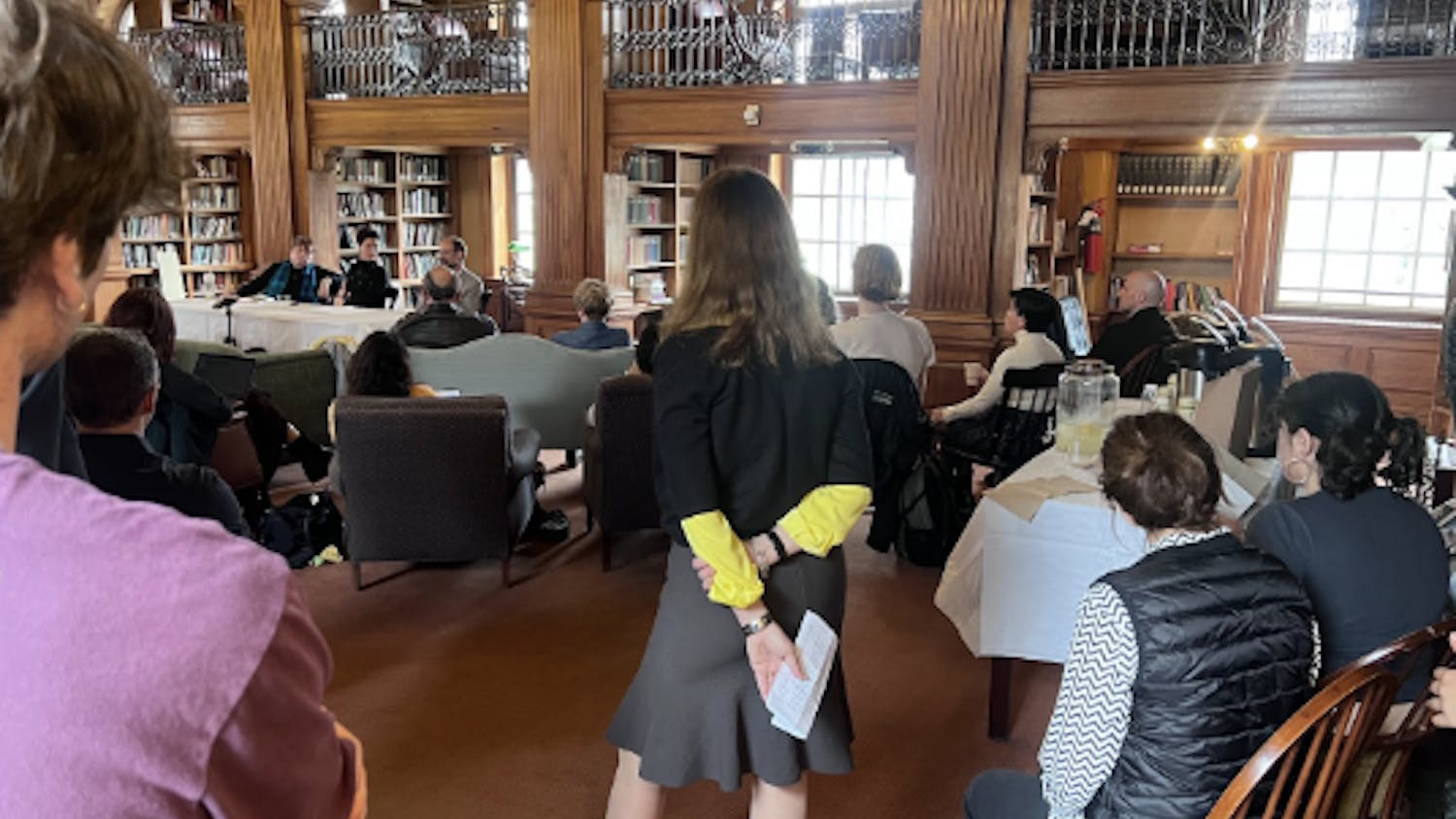The "Metamorphosis," Ovid's story-bag of shiftings -- usually about people turning into trees and other assorted foliage -- could never be produced in full.
With a hundred tales that span over 15 books (in dactylic hexameter!), any director should have to drop such stories as Orpheus and his lyre, Pygmalion and his lovely statue, and Leda the Swan.
The most recent production of Ovid's work, by Northern Stage in White River Junction, however, does not drop the most important part: the beach party.
Just as the theme of "Metamorphosis" is change, it is also water, that most polymorphic of substances. Water means mirrors, transparency, mutability, lotuses, drowning, cleansing and idyllic grottos. It also means splish-splash.
Latin poetry transforms the ridiculous into the sublime. In Ovid, we go back again. Where we have transmogrifications from the human to the divine, the artisan to the animal, the airborne to the earthbound, we also have from clothes-on to clothes-off.
Nymphs and satyrs, played by good, though inadequately tanned and oiled, New York actors, goof around in a set of several tons of golden sand and a serious-looking wading pool.
Take one of the dozen or so stories, most of which blend into each other through shifts in the narrators (who alternately overact their oratory chat pleasantly and familiarly) and actors from a nine-member ensemble.
Iphis loves Anexerete, but Anexerete, too aloof ever to come out from behind her pool-boys, will not deign to greet him -- note that no one cares about the names.
After the pool boys hilariously prance around in "A Funny Thing" style for a while, Iphis becomes so despondent he hangs himself. The boys take his corpse to his mother; Anexerete sees the utter grief she has put Iphis' mother into, and she freezes into a marble statue.
Such quick drops into solemnity happen not infrequently (about a third of the characters consider hanging themselves), but they just as frequently rise back up into frivolity. Demi-gods spit water at each other. The hideous bathing costumes and cruise-wear become wet, and therefore wet.
The sex scenes, appropriate for all ages, replicate third-grade gymastics sequences. The original music for the show samples canned sound-effects -- archetypical "Roman Times" marches and annoying video-game tunes.
After, Midas is cured of his golden touch but then unwisely praises Pan's singing over Apollo's, five actresses play weeds vigorously whispering "King Midas has ass ears!" in the most coy and ridiculous way I've ever heard. Vigorous laughing occurred.
The tragedy and comedy, at levels equal to a very good college performance with a high school sensibility, leave plenty of room for operatic melodrama. A daughter is in love with her father; she disguises herself as a courtesan and sleeps with him for a week. A wife sends her husband to sail down the sea to bring back her sister for a visit; the husband rapes the sister and cuts out her tongue. All three are later turned into birds.
The text and play is fertile ground for the piercing stylus of theory. Erisichthon, a well-built, brash lad, storms into Ceres' sacred forest and chops down the sacred oak in which lives a sacred nymph. The nymph shouts out; he listens not.
Ceres, furious, sends Hunger to gnaw endlessly on Erisichthon. Erisichthon has the greatest desire in his stomach; he eats without stop, lavishing banquet upon luncheon on himself.
He cannot sate the hunger inside; he must buy more and more food, and to buy that food he must sell and sell his goods. After selling his daughter many times -- for money for food -- he has no more possessions and must eat himself.
But not for long does Ovid comment on the irreverence and ultimate downfall of hyper-consumerist culture. The tales are hardly moralistic--the morals they have are, frankly, rather obvious. Instead, they remind the spectator of the ephemerality and irrationality of things. Everything is in a pre-Socratic flux. The passions can always overpower reason; love and anger burn with the same brilliance and poison.
It is almost possible to agree with Ovid here, if it's not possible to overcome disbelief. That the actors don't just act as if they get wet and dirty -- they actually get wet and dirty -- moves the myths from the realm of philology into the realm of the daily and real. That the smoke machine worked more like a smoke cannon, hitting the audience which sits no more than five feet from the stage, emphasized this.
"Metamorphosis" is, I think, a very good time (in its boisterousness, it may be better suited for the older, less cynical crowd, though I did receive a xerox of fun facts for kids). It shows that the founding myths of any culture can retain resonance while being in actually completely inconsequential. A good lesson in taking oneself lightly.
Brooke Wetzel's adaptation of Ovid will play at the Briggs Opera House in downtown White River Junction Saturday at 8 p.m. and Sunday at 5 p.m.



